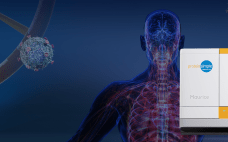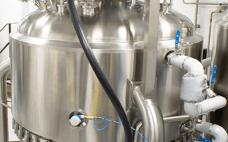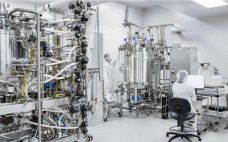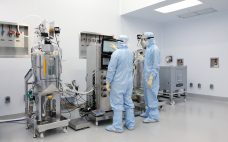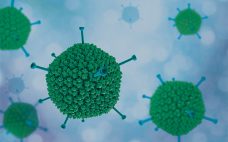Looking for a hassle-free and rapid analytical method to detect full, partially filled, and empty Adeno-associated virus (AAV) capsids for your gene therapy development? Viral capsid content can impact gene therapy product efficacy and is therefore considered a Critical Quality Attribute (CQA) that must be properly evaluated during the development and manufacturing of AAVs. Traditional analytical tools such as transmission electron microscopy (TEM), analytical ultracentrifugation (AUC), and ion-exchange chromatography (IEX) can be used to characterize capsid content but are complex…
Author Archives: BPI Contributor
Manufacturing Capacity and Supply Chain Resilience
This webcast features: Ari Ojinaka, Production Manager, Astrea Bioseparations With increasing demand for vaccines and advanced therapeutic treatments, innovation and resilience are critical to stay ahead of the quickly shifting needs of the industry. As demand for bioseparation products continues to increase and evolve to accommodate traditional and advanced drug profiles, suppliers must ensure that they are delivering more than just products to customers. It is essential to evaluate effective ways to manage and increase capacity and supply chain resilience…
Cell Line Development: Accelerating Process Optimization by Combining AmbrĀ® 15 Cell Culture with OctetĀ® Titer Measurements
Cell line development (CLD) involves the screening of thousands of clones to find those that are stable, produce high yields of the bioproduct and exhibit desired critical quality attributes (CQAs). Typically screening and process optimization activities will be carried out at the small scale in bioreactor cultures to ensure that results translate up to larger bioreactor scales. Performance data is primarily based on cell growth, cell viability, metabolite analysis and product titer, and assessed over the entire culture process duration.…
Recombinant Proteins for Cell and Gene Therapy Research: A Conversation with Shenandoah Biotechnology
Recombinant proteins such as growth factors and cytokines are essential for cell therapy, gene therapy and regenerative medicine research, development and manufacturing. These proteins are critical in the production of desired cell types and subsequent differentiation of cells, to deliver the desired effect. Founded 15 years ago, Shenandoah Biotechnology applies a proprietary method of folding and purifying recombinant proteins from both bacterial and mammalian systems to enable cost-effective, large-scale production of Cell Therapy Grade proteins to support these groundbreaking treatments.…
Enhancement of Tablet Coating Using an Innovative Functional Excipient
During formulation of solid dosage forms, film coating is used to improve the appearance and stability of tablets, make them easier to swallow, mask the taste, modify or sustain release, protect the drug from the harsh gastric environment, protect from moisture and/or oxidation and, as a result, to improve the stability and overall therapeutic effect of the final drug product. Depending on the individual needs, a polymer with appropriate properties is chosen during formulation development to serve as film-coating matrix.…
Cytiva Strategy for Host Cell Protein Control
A critical aspect of therapeutic development and manufacture is host cell protein (HCP) detection, quantitation, and removal from drug substances, to ensure efficacy and prevent immunogenicity. It is important to mitigate risk by challenging your assay for each new molecule and selecting the most suitable kit. Cytiva offers a range of solutions to support scientists and developers in creating an effective strategy for HCP control. Read more about our strategy for HCP control.
A Scalable Platform for GMP and High-Quality Plasmid Manufacturing
This webcast features: Dr. Mack Kuo, Associate Director BioProcess Development, Wacker Biotech US Inc. Demand for high-quality good manufacturing practice (GMP) plasmid DNA has grown significantly in the past few years. The recent proliferation of mRNA manufacturing, DNA vaccines, viral vector production, CAR T-cell therapies, and CRISPR gene editing technologies have all contributed to a bottleneck in availability of plasmid manufacturing capability. With decades of collective plasmid DNA manufacturing experience, the staff at Wacker Biotech US have released over 100…
TESSA Technology: A Plasmid-Free, Scalable System to Transform AAV Manufacture
This webcast features: Dr. Weiheng Su, Principal Scientist, OXGENE Adenoassociated virus (AAV) is a popular choice of viral vector for new gene therapies, but manufacturing systems have not kept pace with biological advances, leaving these therapies costly, difficult to produce at scale, and subject to inherent batch-to-batch variability. In this webinar, Dr. Weiheng Su describes how rethinking AAV manufacture āfrom the ground upā allowed OXGENE to manipulate AAVās natural relationship with adenovirus to address these challenges with their novel tetracycline-enabled…
CAPĀ®Ad ā A Versatile Platform for RCA-free, Industrial Scale Adenoviral Vector Production
Adenoviral vectors are frequently used as gene delivery tools for various medical applications. In most cases, replication-incompetent adenoviruses are employed, which, once they have infected a target cell, cannot spread further in the patientās body. In such applications, regulatory guidelines require that the formation of replication-competent adenoviruses (RCA) in the production process must be minimized. Since the risk of RCA occurrence depends on the adenoviral vector and the cell line used for generating the virus stock and for manufacturing the…
PendoTECH Sensors and Industry 4.0: Integrating a PendoTECH Single Use Sensor System with a Digital Highway
Biopharmaceutical manufacturing is currently evolving with the progression of Industry 4.0. Industry 4.0 refers to the ongoing Fourth Industrial Revolution, which is currently transforming modern manufacturing and production practices through the use of āsmartā technology. This is especially appealing to the biopharmaceutical industry, where production can be a long, meticulous, complex processes, and optimizing manufacturing procedures is critical for success. As a leading supplier of single use technology for the biopharmaceutical industry, PendoTECH has recently explored how its products can…

